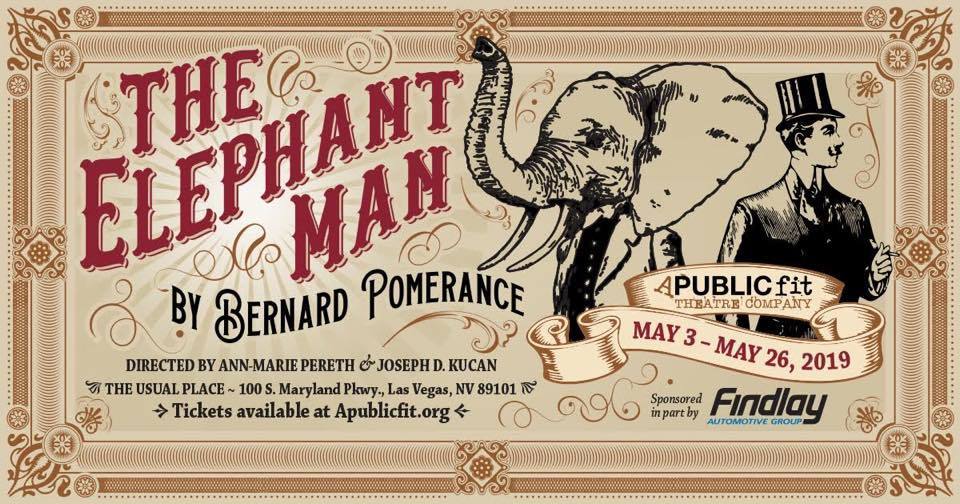Feature: THE ELEPHANT MAN at The Usual Place

Joseph Merrick, known for the extreme deformity of his body and face, lived in the Victorian era and would not be known except his story is dramatized as The Elephant Man. A Public Fit Theatre Company is presenting the Tony-award winning production by Bernard Pomerance starring Kurt Hellerich as Merrick at The Usual Place May 3-26.
The Elephant Man follows the life of the horribly deformed Joseph Merrick (renamed John Merrick in the play) living in the Victorian era. He earns a living by exposing his twisted, disfigured body to spectators in a freak show. A young, ambitious doctor happens to see the show and through a series of circumstances rescues Merrick and takes him to a London hospital where the doctor works. The story explores concepts of acceptance, conformity, and the desire to mold people to fit the norm. The scientific world wants to study Merrick, a religious leader endeavors to save him, and members of high society visit him as an act of mercy.
However, the play calls for no prosthetic makeup on the actor portraying Merrick; instead, his deformity is expressed through physicality, allowing the audience to imagine Merrick's appearance.
Ann-Marie Pereth and Joseph D. Kucan co-directed the play with a special meaning for both of them. Decades ago, Kucan portrayed the lead role of Merrick in The Elephant Man, and Pereth experienced his performance as a member of the audience.
The play is challenging to direct on so many levels. The actor has to express this physical idea of deformity, speak in Merrick's voice, and connect with the other actors. Typically conflict comes from the outside whether it's another character or circumstance. However, with the role of Merrick, the conflict has to come from his physical being. It is a balancing act. When directing the actor about expressing emotion, especially with another actor on stage, Merrick has to combine physicality with emotional expression. As a person, one aspect such as emotion can become dominant with less physicality, yet both are so important to tell the story.
"I would have to tell him that he wasn't correct physically or the emotion wasn't evident because he was concentrating on only one aspect. There are so many facets to creating such a character," explained Pereth. "We rehearsed for about seven weeks, and I am glad we had so much time to truly develop this character."
While the story is set in another century, its themes remain contemporary. "Even today, a person with those deformities would be an outcast. We have all felt like an outcast at one time or another. But we don't have to deal with tumors and skin growths. He has to be able to deal with constant rejection. We can all relate to him that at one time or another, we don't fit in, whether in a small way or in a life encompassing way like Merrick."
The play explores themes of taking humanity away from those who are different. "The wolf senses the sheep in other people and prey on the weak. The play sets the tone that men like to dominate other men," stated Pereth.
Merrick is so vulnerable and is forced to work in a freak show, opening him up to ridicule. However, even in the comfort of the hospital where he ends up, Merrick is still on display. Doctors observe him to analyze his condition. To them, Merrick is just a specimen. Aristocracy comes to see him as an act of perceived kindness and project their qualities on him to make themselves feel better. Merrick is like a piece of art hanging on the wall where everyone discusses their interpretation of it without regard to the soul of the man in the body.
The doctor who rescues Merrick presents the most layered themes of the play. The doctor's objective is to make Merrick an honorable Englishman. He forces Merrick to follow strict rules and standards with the idea that by following his rule of conduct, Merrick will become like everyone else. Merrick is very compliant because of his upgraded living conditions and acceptance by others. However, some of the rules clash with Merrick's sense of truth and his identity. Merrick eventually challenges the doctor, and in the process, the doctor begins to question the conformity of institutions and what is considered normal and acceptable.
The Elephant Man first premiered at the Hampstead Theatre in London on Nov. 7, 1977. It ran off-Broadway and on Broadway from 1979 to 1981. It was made into a movie in 1980 and adapted for television in 1982.
The premiere showing of The Elephant Man is 7:30 p.m. on May 3 at The Usual Place, located at 100 S. Maryland Parkway. The production will continue through May 26, with both evening and matinee times offered. For more information and to buy tickets, visit apublicfit.org.
Comments

Videos

